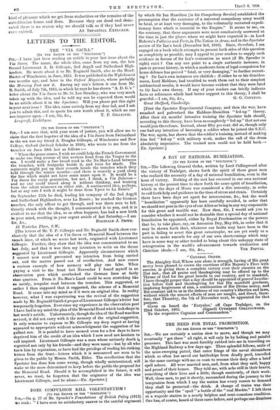[TO THE EDITOR OF TEE " SPECTATOR:1
Em,—I am sure that, with your sense of justice, you will allow me to claim that the first begetter of the idea of a Via Sacra from Switzerland to the sea was my friend A. Douglas Gillespie, of Winchester and New College, Oxford (Ireland Scholar in 1910), who wrote to me from the trenches on June 19th last as follows :—
" When the peace comes, I wish we could help the French Government to make one long avenue of this western front from the Vosges to the rea. I would make a fine broad road in the No-Man's-Land between the trenches, with footpaths beside it, and trees for shade. The regiments might put up their records beside the trenches which they kekl through the winter months—and there is scarcely a yard along the line which might not have some name upon it. It would be a Via Sacra for every generation, but not, I think, a Via Dolorosa-- and no one could travel along it without thinking, and learning from the silent witnesses on either side. A sentimental idea, perhaps, but at any rate I wish it might be done from Ypres to La Bassee." On September 25th he died, leading his company of the 2nd Argyll and Sutherland Highlanders, near La Bass& ; he reached the German trenches, tho only officer to get through, and was there seen to fall. Greatly struck with the thought, I communicated it to you, and it is evident to me that the idea, as so often happens, has had a new birth in your mind, resulting in your cogent article of last Saturday.—I am [The letters of Mr. T. P. Gillespie and Mr. Reginald Smith show con- clusively that the idea of a Via Sacra or Memorial Road between the trench lines, of which we wrote last week, originated with Lieutenant Gillespie. Further, they ELow that the idea was communicated to me hat July, and that it was then my intention to write on the theme auggested by Lieutenant Gillespie. Apparently circumstances which I cannot now recall prevented my intention from being carried oat, and the matter passed out of recollection. And now comes a curious example of how memory will play one false. When raying a visit to the front last November I found myself in an observation post which overlooked the German lines at fairly slose quarters. From it No-Man's-Land could be seen stretching like in untidy, irregular road between the trenches. This suggested, or rather I then supposed that it suggested, the scheme of a Memorial Road. It came into my mind as if it were an original idea. In reality however, what I was experiencing was the revival of the suggestion Inside by Mr. Reginald Smith apropos of Lieutenant Gillespie'e letter but temporarily forgotten. Ever since my experience in the observation post 1 have had in my mind the plan of the Memorial Road which took shape in last week's article. Unfortunately, though the idea of the Road was thus revived, it did not carry with it the memory of the original suggestion. It only remains to express to Mr. Gillespie say deep regret at having appeared to appropriate without acknowledgment the suggestion of his gallant son. It is painful to have seemed even for a few days to have deprived him of the credit of an idea which I now need not hesitate to tall inspired. Lieutenant Gillespie was a man whose untimely death is regretted not only by his friends—and they were many—but by all who knew him by reputation, or have had the privilege of reading his striking letters from the front—letters which it is announced are soon to be given to the public by Messrs. Smith, Elder. The recollection that the Spectator has done him some wrong, though wholly unintentional, will make us the more determined to keep before the public the proposal for the Memorial Road. Should it be accomplished in the future, it will never, we trust, be forgotten that the originator of the idea was Lieutenant Gillespie, and he alone.—En. Spectator.]


































 Previous page
Previous page